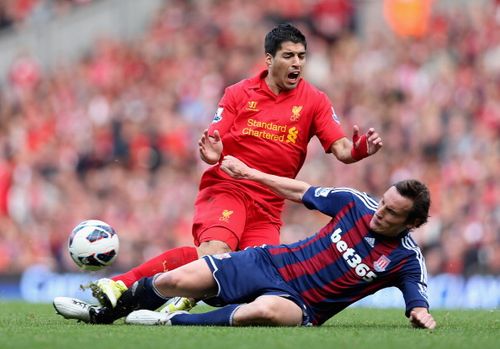
To dive, or not to dive?
‘Always cheating, same old Suarez’, chanted a very cranky Mansfield Field Mill in retaliation to a very hotly-contested controversial goal by Luis Suarez, which he scored with his hand.
No sooner had he dived in anticipation to earn a penalty in a dull 0-0 draw between Stoke City and Liverpool, he sensationalized an universal fact. He even had the audacity of coming out in front of the media and admitting that he does dive in games to swing the tie in their favour. This attitude of Suarez was not taken well by Brendan Rodgers who said he had acted stupidly and shall be dealt by the club internally.

Dean Whitehead of Stoke City tackles Luis Suarez of Liverpool during their teams Barclays Premier League match at Anfield on October 7, 2012 in Liverpool, England. (Getty Images)
When players cheat and dive in a game to gain the upper hand, is it morally acceptable? Does it all add to the already spiced up aspect of the game?
No disrespect to Luis though, he is an excellent and intelligent footballer. His determination coupled with his outrageous finishing makes him stand out from his Liverpool colleagues. He tends to test the patience of neutral footballing fans by pulling off cheap shots to inch closer to victory. Does Suarez’s predilection for taking a fall in times of need go a little too far? He isn’t the only one that had spread the infection of diving.
To dive, or not to dive, that remains the most heated controversial question, which just fails to get a fitting answer.
Firstly, the game involves such high stakes that players very often look for situations that tend to disturb the balance in their favour, be it fair or foul. Secondly, diving is as good as acting; it’s an art in itself. Thirdly, when faced with a situation where in your opponent is tugging onto your shirt, aren’t you entitled to go down? Keep in mind that these three instances are all carved out by looking into practicality and has nothing to do with fairness and sportsmanship. A rational footballer may dive to benefit from the situation, keeping in mind that failing to deceive the arbitrator leads to punishment in the form of the customary yellow card.
Arguments against diving are done with reference to moral criteria. Diving is not only against the laws of the game, but also questions the very spirit with which the game is played. Every sport is governed by a varied set of rules and laws but the spirit remains the same. A 100 meter sprint is a test of speed and endurance. Golf tests patience, skill and the reliability of your caddy! Basketball tests the co-ordination that exists between your feet and hand. But spirit, sportsmanship and fair play exists in all irrespective of whether you kick a ball, throw darts or rev around a circuit at 300 kmph!
Take the example of a boxing bout. Two men face each other knowing that victory is certain if the other is pinned down for 10 seconds. Now how can you achieve this? You could either take a baseball bat and batter your opponent’s face beyond recognition, which of course violates the laws of the sport or you could wait for a slight lapse in concentration of the referee and produce a kick to the groin, which again is playing outside the rules. Or stick to your basics, practise what you’ve done at training and give it your best. Ultimately, no matter what you do, you’re always under certain stipulations that mark your way to success.
The primary goal for every football player is to put the ball in the back of the net, and in doing so, prevent your opponent in repeating the act. The rules of the game make the target difficult to achieve, but that’s what makes the sport ever so competitive!
Which again brings me to my point, diving to achieve the upper hand may give you an advantage but it hampers your reputation in the process. Would you rather have a testimonial to be conducted just for the sake of it? Or have millions of people thriving to get seats into a packed stadium just to see you kick the ball for the last time?

Luis Suarez of Uruguay handles the ball on the goal line, for which he is sent off, during the 2010 FIFA World Cup Quarterfinal against Ghana on July 2, 2010 in Johannesburg, South Africa. (Getty Images)
So here’s my two pence: Diving in the law books is a violation, well so is murdering someone. The consequence of a murder is life in jail or a walk to the gallows, but for diving, it’s just a mere yellow card. So when a footballer is faced with a situation, which could potentially end their quest for glory, he tends to risk it than have to watch the latter stages of the tournament on the comfort of his couch. Clearly projected in the encounter in the World Cup 2010 quarterfinals between Ghana and Uruguay when… ah, you again Luis?